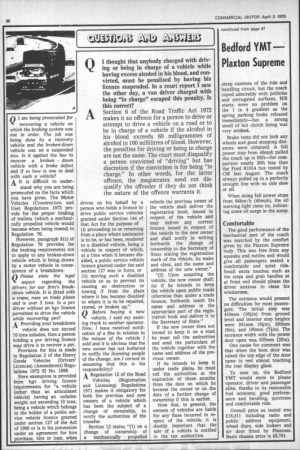Q I am being prosecuted for recovering a vehicle on which
Page 50

If you've noticed an error in this article please click here to report it so we can fix it.
the braking system was not in order. The job was being done by a recovery vehicle and the broken-down vehicle was on a suspended tow. Is it against the law to recover a broken down vehicle with a brake defect and if so how is one to deal with such a vehicle? A It is difficult to under stand why you are being prosecuted on the facts which you have given. The Motor Vehicles (Construction and Use) Regulations 1973 provide for the proper braking of trailers (which a mechanically propelled vehicle would become when being towed) in Regulation 70.
However, paragraph 3(c) of Regulation 70 provides for the braking requirements not to apply to any broken-down vehicle which is being drawn by a motor vehicle in consequence of a breakdown.
Please state the legal aspect regarding the drivers for our firm's breakdown vehicle. It is fitted with a crane, runs on trade plates and is over 3 tons. Is a psv driver without an hgv licence permitted to drive the vehicle while recovering psv? A Providing your breakdown vehicle does not exceed 10 tons unladen, then a person holding a psv driving licence may drive it to recover a psv.
Provision for this is made in Regulation 2 of the Heavy Goods Vehicles (Drivers' Licences) (Amendment) Regulations 1972 SI No. 1956.
Here exemption is provided from hgv driving licence requirements for "a vehicle (other than an articulated vehicle) having an unladen weight not exceeding 10 tons, being a vehicle which belongs to the holder of a public service vehicle licence granted under section 127 of the Act of 1960 or is in his possession under an agreement for hire purchase, hire or loan, when driven on his behalf by a person who holds a licence to drive public service vehicles granted under Section 144 of that Act for the purpose of (i) proceeding to or returning from a place where assistance is to be, or has been, rendered to a disabled vehicle, being a vehicle in respect of which, at a time when it became disabled, a public service vehicle licence granted under the said section 127 was in force, or (ii) moving such a disabled vehicle so as to prevent its causing an obstruction or towing if from the place where it has become disabled to where it is to be repaired, stored, or broken up."
QBefore buying a new vehicle, I sold my existing truck to another operator. Now, I have received notification of a fine in relation to the misuse of the vehicle I sold and it is obvious that the new owner has not bothered to notify the licensing people of the change. Am I correct in assuming that this is his responsibility? A Regulation 12 of the Road Vehicles (Registration and Licensing) Regulations 1971 makes it obligatory for both the previous and new owners of a vehicle which has been the subject of a change of ownership, to notify the authorities of the transfer.
Section 12 states "(1) on a change of ownership of a mechanically propelled vehicle the previous owner of the vehicle shall deliver the registration book, issued in respect of the vehicle and may deliver any current licence issued in respect of the vehicle to the new owner and shall notify in writing forthwith the change of ownership to the Secretary of State stating the registration mark of the v'ehicle, its make and class, and the name and address of the new owner."
"(2) Upon acquiring the vehicle, the new owner shall: (a) if he intends to keep the vehicle upon public roads otherwise than under a trade licence, forthwith insert his name and address in the appropriate part of the registration book and deliver it to the Secretary of State."
If the new owner does not intend to keep it on a road he must tell the authorities and send the particulars of the vehicle together with the name and address of the previous owner.
If he intends to keep it under trade plates he must tell the authorities at the expiration of three months from the date on which he became the owner or on the date of a further change of ownership if this is earlier.
Now that, in general, the owners of vehicles are liable for any fines incurred in respect of the vehicle, it is doubly important that the sale of a vehicle is notified to the tax authorities.




























































































